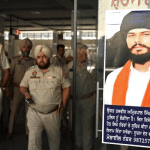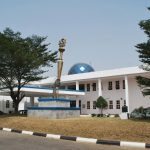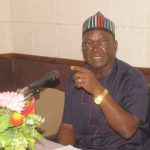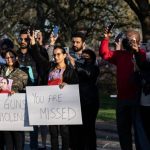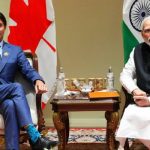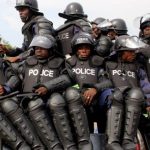Canada has accused India of involvement in the killing of a Canadian Sikh leader, an allegation strongly denied by Delhi.
On Monday PM Justin Trudeau said Canada was looking at “credible allegations potentially linking” the Indian state to Hardeep Singh Nijjar’s murder.
Mr Nijjar was was shot dead outside a Sikh temple on 18 June in Canada.
India has expelled a Canadian diplomat after Canada expelled Indian diplomat Pavan Kumar Rai over the case.
Mr Nijjar, 45, was shot dead in his vehicle by two masked gunmen in the busy car park of the Guru Nanak Sikh Gurdwara in Surrey, a city about 30km (18 miles) east of Vancouver.
A prominent Sikh separatist leader in the western-most province of British Columbia, he publicly campaigned for Khalistan – the creation of an independent Sikh homeland in the Punjab region of India.
Sikhs are a religious minority that make up about 2% of India’s population. Some groups have long called for a separate homeland for Sikhs.
In the 1970s Sikhs launched a separatist insurgency in India which saw thousands killed before it was quelled the following decade.
Since then, the movement has been mostly limited to countries with large Sikh populations such as Canada and the UK. There are an estimated 1.4 to 1.8 million Canadians of Indian origin and the country has the largest population of Sikhs outside Punjab.
India has in the past described Mr Nijjar as a terrorist who led a militant separatist group – accusations his supporters say are unfounded. They say he had received threats in the past because of his activism.
Hardeep Singh Nijjar was murdered on 18 June in Surrey, British Columbia, in what police have described as a “targeted” attack.
Mr Trudeau said in parliament on Monday that he had raised the issue of Mr Nijjar’s killing with Indian Prime Minister Narendra Modi at the recent G20 summit in Delhi.
“Any involvement of a foreign government in the killing of a Canadian citizen on Canadian soil is an unacceptable violation of our sovereignty,” he told lawmakers.
On Tuesday, India’s ministry of external affairs said that it “completely rejected” Mr Trudeau’s claims which it described as “absurd” and politically motivated.
“We are a democratic polity with a strong commitment to rule of law,” the ministry said in a statement.
It accused Canada of providing shelter to “Khalistani terrorists and extremists” who threaten India’s security.
“We urge the government of Canada to take prompt and effective legal action against all anti-India elements operating from their soil,” the ministry said.
After Mr Trudeau’s comments, several large posters and tributes to Mr Nijjar were visible at the Guru Nanak Sikh Gurdwara in Surrey.
Canada has accused India of involvement in the killing of a Canadian Sikh leader, an allegation strongly denied by Delhi.
On Monday PM Justin Trudeau said Canada was looking at “credible allegations potentially linking” the Indian state to Hardeep Singh Nijjar’s murder.
Mr Nijjar was was shot dead outside a Sikh temple on 18 June in Canada.
India has expelled a Canadian diplomat after Canada expelled Indian diplomat Pavan Kumar Rai over the case.
Mr Nijjar, 45, was shot dead in his vehicle by two masked gunmen in the busy car park of the Guru Nanak Sikh Gurdwara in Surrey, a city about 30km (18 miles) east of Vancouver.
A prominent Sikh separatist leader in the western-most province of British Columbia, he publicly campaigned for Khalistan – the creation of an independent Sikh homeland in the Punjab region of India.
Sikhs are a religious minority that make up about 2% of India’s population. Some groups have long called for a separate homeland for Sikhs.
In the 1970s Sikhs launched a separatist insurgency in India which saw thousands killed before it was quelled the following decade.
Since then, the movement has been mostly limited to countries with large Sikh populations such as Canada and the UK. There are an estimated 1.4 to 1.8 million Canadians of Indian origin and the country has the largest population of Sikhs outside Punjab.
India has in the past described Mr Nijjar as a terrorist who led a militant separatist group – accusations his supporters say are unfounded. They say he had received threats in the past because of his activism.
Hardeep Singh Nijjar was murdered on 18 June in Surrey, British Columbia, in what police have described as a “targeted” attack.
Mr Trudeau said in parliament on Monday that he had raised the issue of Mr Nijjar’s killing with Indian Prime Minister Narendra Modi at the recent G20 summit in Delhi.
“Any involvement of a foreign government in the killing of a Canadian citizen on Canadian soil is an unacceptable violation of our sovereignty,” he told lawmakers.
On Tuesday, India’s ministry of external affairs said that it “completely rejected” Mr Trudeau’s claims which it described as “absurd” and politically motivated.
“We are a democratic polity with a strong commitment to rule of law,” the ministry said in a statement.
It accused Canada of providing shelter to “Khalistani terrorists and extremists” who threaten India’s security.
“We urge the government of Canada to take prompt and effective legal action against all anti-India elements operating from their soil,” the ministry said.
After Mr Trudeau’s comments, several large posters and tributes to Mr Nijjar were visible at the Guru Nanak Sikh Gurdwara in Surrey.
Canada has accused India of involvement in the killing of a Canadian Sikh leader, an allegation strongly denied by Delhi.
On Monday PM Justin Trudeau said Canada was looking at “credible allegations potentially linking” the Indian state to Hardeep Singh Nijjar’s murder.
Mr Nijjar was was shot dead outside a Sikh temple on 18 June in Canada.
India has expelled a Canadian diplomat after Canada expelled Indian diplomat Pavan Kumar Rai over the case.
Mr Nijjar, 45, was shot dead in his vehicle by two masked gunmen in the busy car park of the Guru Nanak Sikh Gurdwara in Surrey, a city about 30km (18 miles) east of Vancouver.
A prominent Sikh separatist leader in the western-most province of British Columbia, he publicly campaigned for Khalistan – the creation of an independent Sikh homeland in the Punjab region of India.
Sikhs are a religious minority that make up about 2% of India’s population. Some groups have long called for a separate homeland for Sikhs.
In the 1970s Sikhs launched a separatist insurgency in India which saw thousands killed before it was quelled the following decade.
Since then, the movement has been mostly limited to countries with large Sikh populations such as Canada and the UK. There are an estimated 1.4 to 1.8 million Canadians of Indian origin and the country has the largest population of Sikhs outside Punjab.
India has in the past described Mr Nijjar as a terrorist who led a militant separatist group – accusations his supporters say are unfounded. They say he had received threats in the past because of his activism.
Hardeep Singh Nijjar was murdered on 18 June in Surrey, British Columbia, in what police have described as a “targeted” attack.
Mr Trudeau said in parliament on Monday that he had raised the issue of Mr Nijjar’s killing with Indian Prime Minister Narendra Modi at the recent G20 summit in Delhi.
“Any involvement of a foreign government in the killing of a Canadian citizen on Canadian soil is an unacceptable violation of our sovereignty,” he told lawmakers.
On Tuesday, India’s ministry of external affairs said that it “completely rejected” Mr Trudeau’s claims which it described as “absurd” and politically motivated.
“We are a democratic polity with a strong commitment to rule of law,” the ministry said in a statement.
It accused Canada of providing shelter to “Khalistani terrorists and extremists” who threaten India’s security.
“We urge the government of Canada to take prompt and effective legal action against all anti-India elements operating from their soil,” the ministry said.
After Mr Trudeau’s comments, several large posters and tributes to Mr Nijjar were visible at the Guru Nanak Sikh Gurdwara in Surrey.
Canada has accused India of involvement in the killing of a Canadian Sikh leader, an allegation strongly denied by Delhi.
On Monday PM Justin Trudeau said Canada was looking at “credible allegations potentially linking” the Indian state to Hardeep Singh Nijjar’s murder.
Mr Nijjar was was shot dead outside a Sikh temple on 18 June in Canada.
India has expelled a Canadian diplomat after Canada expelled Indian diplomat Pavan Kumar Rai over the case.
Mr Nijjar, 45, was shot dead in his vehicle by two masked gunmen in the busy car park of the Guru Nanak Sikh Gurdwara in Surrey, a city about 30km (18 miles) east of Vancouver.
A prominent Sikh separatist leader in the western-most province of British Columbia, he publicly campaigned for Khalistan – the creation of an independent Sikh homeland in the Punjab region of India.
Sikhs are a religious minority that make up about 2% of India’s population. Some groups have long called for a separate homeland for Sikhs.
In the 1970s Sikhs launched a separatist insurgency in India which saw thousands killed before it was quelled the following decade.
Since then, the movement has been mostly limited to countries with large Sikh populations such as Canada and the UK. There are an estimated 1.4 to 1.8 million Canadians of Indian origin and the country has the largest population of Sikhs outside Punjab.
India has in the past described Mr Nijjar as a terrorist who led a militant separatist group – accusations his supporters say are unfounded. They say he had received threats in the past because of his activism.
Hardeep Singh Nijjar was murdered on 18 June in Surrey, British Columbia, in what police have described as a “targeted” attack.
Mr Trudeau said in parliament on Monday that he had raised the issue of Mr Nijjar’s killing with Indian Prime Minister Narendra Modi at the recent G20 summit in Delhi.
“Any involvement of a foreign government in the killing of a Canadian citizen on Canadian soil is an unacceptable violation of our sovereignty,” he told lawmakers.
On Tuesday, India’s ministry of external affairs said that it “completely rejected” Mr Trudeau’s claims which it described as “absurd” and politically motivated.
“We are a democratic polity with a strong commitment to rule of law,” the ministry said in a statement.
It accused Canada of providing shelter to “Khalistani terrorists and extremists” who threaten India’s security.
“We urge the government of Canada to take prompt and effective legal action against all anti-India elements operating from their soil,” the ministry said.
After Mr Trudeau’s comments, several large posters and tributes to Mr Nijjar were visible at the Guru Nanak Sikh Gurdwara in Surrey.
Canada has accused India of involvement in the killing of a Canadian Sikh leader, an allegation strongly denied by Delhi.
On Monday PM Justin Trudeau said Canada was looking at “credible allegations potentially linking” the Indian state to Hardeep Singh Nijjar’s murder.
Mr Nijjar was was shot dead outside a Sikh temple on 18 June in Canada.
India has expelled a Canadian diplomat after Canada expelled Indian diplomat Pavan Kumar Rai over the case.
Mr Nijjar, 45, was shot dead in his vehicle by two masked gunmen in the busy car park of the Guru Nanak Sikh Gurdwara in Surrey, a city about 30km (18 miles) east of Vancouver.
A prominent Sikh separatist leader in the western-most province of British Columbia, he publicly campaigned for Khalistan – the creation of an independent Sikh homeland in the Punjab region of India.
Sikhs are a religious minority that make up about 2% of India’s population. Some groups have long called for a separate homeland for Sikhs.
In the 1970s Sikhs launched a separatist insurgency in India which saw thousands killed before it was quelled the following decade.
Since then, the movement has been mostly limited to countries with large Sikh populations such as Canada and the UK. There are an estimated 1.4 to 1.8 million Canadians of Indian origin and the country has the largest population of Sikhs outside Punjab.
India has in the past described Mr Nijjar as a terrorist who led a militant separatist group – accusations his supporters say are unfounded. They say he had received threats in the past because of his activism.
Hardeep Singh Nijjar was murdered on 18 June in Surrey, British Columbia, in what police have described as a “targeted” attack.
Mr Trudeau said in parliament on Monday that he had raised the issue of Mr Nijjar’s killing with Indian Prime Minister Narendra Modi at the recent G20 summit in Delhi.
“Any involvement of a foreign government in the killing of a Canadian citizen on Canadian soil is an unacceptable violation of our sovereignty,” he told lawmakers.
On Tuesday, India’s ministry of external affairs said that it “completely rejected” Mr Trudeau’s claims which it described as “absurd” and politically motivated.
“We are a democratic polity with a strong commitment to rule of law,” the ministry said in a statement.
It accused Canada of providing shelter to “Khalistani terrorists and extremists” who threaten India’s security.
“We urge the government of Canada to take prompt and effective legal action against all anti-India elements operating from their soil,” the ministry said.
After Mr Trudeau’s comments, several large posters and tributes to Mr Nijjar were visible at the Guru Nanak Sikh Gurdwara in Surrey.
Canada has accused India of involvement in the killing of a Canadian Sikh leader, an allegation strongly denied by Delhi.
On Monday PM Justin Trudeau said Canada was looking at “credible allegations potentially linking” the Indian state to Hardeep Singh Nijjar’s murder.
Mr Nijjar was was shot dead outside a Sikh temple on 18 June in Canada.
India has expelled a Canadian diplomat after Canada expelled Indian diplomat Pavan Kumar Rai over the case.
Mr Nijjar, 45, was shot dead in his vehicle by two masked gunmen in the busy car park of the Guru Nanak Sikh Gurdwara in Surrey, a city about 30km (18 miles) east of Vancouver.
A prominent Sikh separatist leader in the western-most province of British Columbia, he publicly campaigned for Khalistan – the creation of an independent Sikh homeland in the Punjab region of India.
Sikhs are a religious minority that make up about 2% of India’s population. Some groups have long called for a separate homeland for Sikhs.
In the 1970s Sikhs launched a separatist insurgency in India which saw thousands killed before it was quelled the following decade.
Since then, the movement has been mostly limited to countries with large Sikh populations such as Canada and the UK. There are an estimated 1.4 to 1.8 million Canadians of Indian origin and the country has the largest population of Sikhs outside Punjab.
India has in the past described Mr Nijjar as a terrorist who led a militant separatist group – accusations his supporters say are unfounded. They say he had received threats in the past because of his activism.
Hardeep Singh Nijjar was murdered on 18 June in Surrey, British Columbia, in what police have described as a “targeted” attack.
Mr Trudeau said in parliament on Monday that he had raised the issue of Mr Nijjar’s killing with Indian Prime Minister Narendra Modi at the recent G20 summit in Delhi.
“Any involvement of a foreign government in the killing of a Canadian citizen on Canadian soil is an unacceptable violation of our sovereignty,” he told lawmakers.
On Tuesday, India’s ministry of external affairs said that it “completely rejected” Mr Trudeau’s claims which it described as “absurd” and politically motivated.
“We are a democratic polity with a strong commitment to rule of law,” the ministry said in a statement.
It accused Canada of providing shelter to “Khalistani terrorists and extremists” who threaten India’s security.
“We urge the government of Canada to take prompt and effective legal action against all anti-India elements operating from their soil,” the ministry said.
After Mr Trudeau’s comments, several large posters and tributes to Mr Nijjar were visible at the Guru Nanak Sikh Gurdwara in Surrey.
Canada has accused India of involvement in the killing of a Canadian Sikh leader, an allegation strongly denied by Delhi.
On Monday PM Justin Trudeau said Canada was looking at “credible allegations potentially linking” the Indian state to Hardeep Singh Nijjar’s murder.
Mr Nijjar was was shot dead outside a Sikh temple on 18 June in Canada.
India has expelled a Canadian diplomat after Canada expelled Indian diplomat Pavan Kumar Rai over the case.
Mr Nijjar, 45, was shot dead in his vehicle by two masked gunmen in the busy car park of the Guru Nanak Sikh Gurdwara in Surrey, a city about 30km (18 miles) east of Vancouver.
A prominent Sikh separatist leader in the western-most province of British Columbia, he publicly campaigned for Khalistan – the creation of an independent Sikh homeland in the Punjab region of India.
Sikhs are a religious minority that make up about 2% of India’s population. Some groups have long called for a separate homeland for Sikhs.
In the 1970s Sikhs launched a separatist insurgency in India which saw thousands killed before it was quelled the following decade.
Since then, the movement has been mostly limited to countries with large Sikh populations such as Canada and the UK. There are an estimated 1.4 to 1.8 million Canadians of Indian origin and the country has the largest population of Sikhs outside Punjab.
India has in the past described Mr Nijjar as a terrorist who led a militant separatist group – accusations his supporters say are unfounded. They say he had received threats in the past because of his activism.
Hardeep Singh Nijjar was murdered on 18 June in Surrey, British Columbia, in what police have described as a “targeted” attack.
Mr Trudeau said in parliament on Monday that he had raised the issue of Mr Nijjar’s killing with Indian Prime Minister Narendra Modi at the recent G20 summit in Delhi.
“Any involvement of a foreign government in the killing of a Canadian citizen on Canadian soil is an unacceptable violation of our sovereignty,” he told lawmakers.
On Tuesday, India’s ministry of external affairs said that it “completely rejected” Mr Trudeau’s claims which it described as “absurd” and politically motivated.
“We are a democratic polity with a strong commitment to rule of law,” the ministry said in a statement.
It accused Canada of providing shelter to “Khalistani terrorists and extremists” who threaten India’s security.
“We urge the government of Canada to take prompt and effective legal action against all anti-India elements operating from their soil,” the ministry said.
After Mr Trudeau’s comments, several large posters and tributes to Mr Nijjar were visible at the Guru Nanak Sikh Gurdwara in Surrey.
Canada has accused India of involvement in the killing of a Canadian Sikh leader, an allegation strongly denied by Delhi.
On Monday PM Justin Trudeau said Canada was looking at “credible allegations potentially linking” the Indian state to Hardeep Singh Nijjar’s murder.
Mr Nijjar was was shot dead outside a Sikh temple on 18 June in Canada.
India has expelled a Canadian diplomat after Canada expelled Indian diplomat Pavan Kumar Rai over the case.
Mr Nijjar, 45, was shot dead in his vehicle by two masked gunmen in the busy car park of the Guru Nanak Sikh Gurdwara in Surrey, a city about 30km (18 miles) east of Vancouver.
A prominent Sikh separatist leader in the western-most province of British Columbia, he publicly campaigned for Khalistan – the creation of an independent Sikh homeland in the Punjab region of India.
Sikhs are a religious minority that make up about 2% of India’s population. Some groups have long called for a separate homeland for Sikhs.
In the 1970s Sikhs launched a separatist insurgency in India which saw thousands killed before it was quelled the following decade.
Since then, the movement has been mostly limited to countries with large Sikh populations such as Canada and the UK. There are an estimated 1.4 to 1.8 million Canadians of Indian origin and the country has the largest population of Sikhs outside Punjab.
India has in the past described Mr Nijjar as a terrorist who led a militant separatist group – accusations his supporters say are unfounded. They say he had received threats in the past because of his activism.
Hardeep Singh Nijjar was murdered on 18 June in Surrey, British Columbia, in what police have described as a “targeted” attack.
Mr Trudeau said in parliament on Monday that he had raised the issue of Mr Nijjar’s killing with Indian Prime Minister Narendra Modi at the recent G20 summit in Delhi.
“Any involvement of a foreign government in the killing of a Canadian citizen on Canadian soil is an unacceptable violation of our sovereignty,” he told lawmakers.
On Tuesday, India’s ministry of external affairs said that it “completely rejected” Mr Trudeau’s claims which it described as “absurd” and politically motivated.
“We are a democratic polity with a strong commitment to rule of law,” the ministry said in a statement.
It accused Canada of providing shelter to “Khalistani terrorists and extremists” who threaten India’s security.
“We urge the government of Canada to take prompt and effective legal action against all anti-India elements operating from their soil,” the ministry said.
After Mr Trudeau’s comments, several large posters and tributes to Mr Nijjar were visible at the Guru Nanak Sikh Gurdwara in Surrey.



